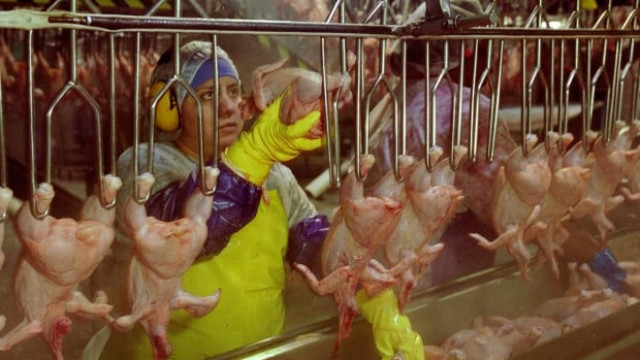Competition Commission of Pakistan takes note of rising poultry prices
Inquiry reveals 19 poultry feed companies were involved in price coordination

Prices of chicken and eggs have almost doubled due to collusion among poultry feed companies that collectively decided to raise the cost of feed despite a reduction in rates of their main input, said the Competition Commission of Pakistan (CCP) on Friday.
The anti-trust watchdog has completed an inquiry into the poultry industry where it has been revealed that 19 poultry feed companies are involved in price coordination and their alleged anti-competitive conduct has caused a rise in poultry feed prices.
“It appears that not only is the timing of the price increase coordinated but the exact quantum of the increase is also coordinated,” according to findings of an inquiry report.
The CCP findings came amid a sharp rise in prices of chicken and eggs – the two protein-rich food items that have started getting out of reach of the lowest income group.
The CCP said that the feed companies’ claim that they increased prices due to an increase in their input cost did not hold merit. “Whereas prices of some inputs may have increased, each mill has purchased these inputs at different rates and has stocks in hand with different, cost structure, efficiency and business model,” it added.
Pakistan’s annual poultry feed consumption in 2019-20 was 6.6 million tons, but the overall consumption of poultry feed had been declining annually from its peak of 9.76 million tons in 2015-16.
The Covid-related preventive measures taken by the government including curbing public gatherings, closure of marriage halls, restaurants, etc have had a knock-on effect on the demand for poultry meat.
The consumption of poultry meat fell by 7% as compared to the previous year and egg consumption grew by 2% for the same period, according to the CCP.
READ High taxes a hurdle to poultry sector growth
Pakistan is ranked 11th largest poultry producer in the world and the current investment in the poultry sector is more than Rs700 billion.
The CCP said that poultry feed accounted for approximately 75-80% of the cost of broiler meat and eggs. Therefore, the hike in feed prices has affected prices of chicken and eggs.
The CCP’s inquiry revealed that from December 2018 to December 2020, the feed mills colluded to raise poultry feed prices by Rs825 per 50kg bag, thus making the feed 32% costlier for the poultry farmers.
Moreover, Pakistan Bureau of Statistics (PBS) data for September 2020 showed that chicken prices rose by 18.31% and eggs by 5.2%. The rise in these prices coincided with the increase in feed prices by almost Rs100 per bag, according to the inquiry.
In October 2020, after another price increase by the poultry feed mills (by Rs125 for layer and Rs175 for broiler feed), chicken prices rose by 26.62% and eggs by 23.81% as compared to the previous month.
Then again in November 2020, the poultry feed prices rose by Rs150 per bag, and in this month, the prices of chicken and eggs rose by 20.76% and 5.23% respectively.
Another increase came in December last year, when poultry feed prices were increased by Rs250 per bag, which caused prices of chicken and eggs to rise by 3.21% and 14.1% respectively.
The CCP took a suo motu notice of the concerns and complaints received through the PM Citizens Portal and the CCP’s own online complaint management system, alleging that some of the leading mills collusively raised poultry feed prices.
The complainants also included poultry farmers whose business was hit by the costlier feed prices.
The commission authorised two teams of officers for inspection of the premises in use of Sadiq Feeds Pvt Limited, Rawalpindi and National Feeds Limited, Lahore. In February 2021, the CCP raided two major poultry feed producers and seized crucial evidence pointing towards price change coordination among the feed companies.
The impounded record revealed that officials of 19 feed mills were using an active WhatsApp group where one feed producer would announce its intended price increase and the rest expressing and sharing their willingness to follow suit.
Price discussions included the effective date and amount of the rise. These discussions and decisions were implemented on the ground, as evident from the official price lists of these companies.
The inquiry also found that mills carried out price changes between December 2018 and December 2020 in a coordinated manner at short intervals at least 11 times.
In addition, the data revealed that not only were price revisions made on the exact dates, but the amounts of price change were also similar.
READ Poultry farmers allegedly cut supply to keep prices high
The CCP said that an analysis of the poultry feed input costs showed that maize, which was the primary component, constituted 55-60% in terms of physical usage in feed, approximately 40% of the cost.
In FY 2019-20, maize prices fell by 7% compared to the previous year and in the first quarter of FY21, the prices were 22% lower than 2019-20.
On the other hand, prices of soybean meal, another critical raw material, were higher by about 24% in the last fiscal year.
The CCP said that a rise in input prices could not be used as a justification to increase feed prices uniformly as each mill had a different cost structure and business model.
Poultry feed mills are each other’s competitors and any discussion and coordination on prices is prohibited under Section 4 of the Competition Act 2010.
The CCP said that it would serve show cause notices to the poultry feed companies involved in violation of Section 4 of the Act.



















COMMENTS
Comments are moderated and generally will be posted if they are on-topic and not abusive.
For more information, please see our Comments FAQ